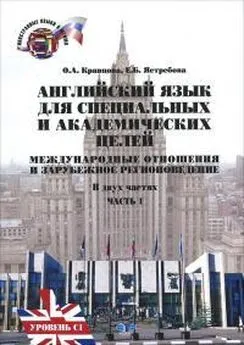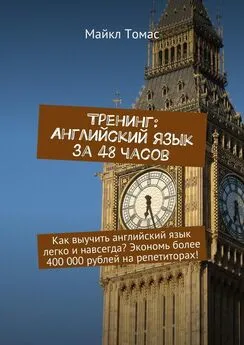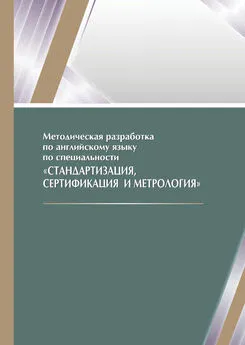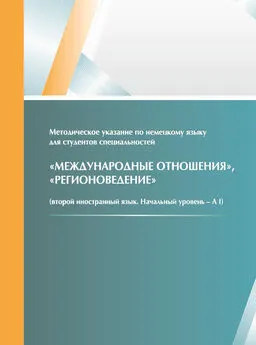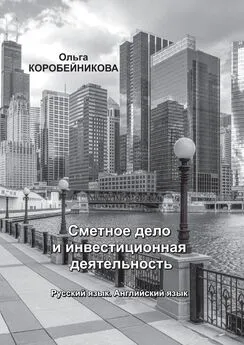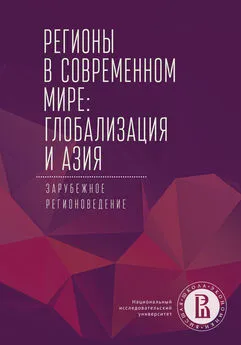Ольга Кравцова - Английский язык для специальных и академических целей: Международные отношения и зарубежное регионоведение. Часть 1
- Название:Английский язык для специальных и академических целей: Международные отношения и зарубежное регионоведение. Часть 1
- Автор:
- Жанр:
- Издательство:МГИМО-Университет
- Год:2015
- ISBN:978-5-9228-1210-8
- Рейтинг:
- Избранное:Добавить в избранное
-
Отзывы:
-
Ваша оценка:
Ольга Кравцова - Английский язык для специальных и академических целей: Международные отношения и зарубежное регионоведение. Часть 1 краткое содержание
Адресовано студентам четвертого курса факультетов и отделений международных отношений и зарубежного регионоведения.
Английский язык для специальных и академических целей: Международные отношения и зарубежное регионоведение. Часть 1 - читать онлайн бесплатно полную версию (весь текст целиком)
Интервал:
Закладка:
http://www.newstatesman.com/2014/02/notes-series-scandals
By David Runciman
6 February, 2014
British democracy is going through its worst crisis of confidence in decades. The underlying cause is economic. The recovery since the crash of 2008 has been the slowest in modern times. For Labour, the fear is that the party will continue to carry the can for allowing the mess to happen in the first place; for the coalition partners, it is that they will get blamed for the woefully unequal and piecemeal recovery. In this climate of uncertainty and distress, fringe parties and maverick voices have a golden opportunity. It's not only Nigel Farage who ends up being taken seriously — even Russell Brand gets his moment in the political sun.
The Reader
However, the primary symptoms of the malaise of British democracy are institutional. Over the past five years the standing of many of the central institutions of British public life has been undermined by scandal. The banks have forfeited public trust as a result of the corruption and incompetence that was exposed during and after the financial crisis. The reputation of parliament was gravely damaged by the expenses scandal that came to light in 2009 and has been rumbling on through the courts and the media ever since. The press saw what remained of its reputation for probity shredded by the phone-hacking scandal and subsequent Leveson inquiry.
The police have been heavily implicated in the worst examples of press behaviour. This is not only in relation to phone-hacking but dates back to the Hillsborough disaster nearly 25 years ago — in which the evidence of widespread misconduct by the South Yorkshire force drew a fulsome apology from the Prime Minister in 2012. Now the London Met is grappling with the fallout from “Plebgate”, a saga that is all the more damaging for being so absurd (the saying “It's not the crime, it's the cover-up” was never more true than in this case). The BBC is still reeling from the scandal surrounding the activities of Jimmy Savile and the exposure of ludicrously generous payoffs to executives caught up in it. This summer we discovered that the British secret services have been routinely eavesdropping on the everyday activities of ordinary British citizens, aiding and abetting the far more extensive surveillance operations being undertaken by the Americans.
The armed forces have emerged relatively unscathed from this period of purgatory for public institutions, although even they have been tarnished by revelations about past brutalities in Northern Ireland and Iraq. Perhaps it is only the monarchy whose reputation has risen in recent years, which says something about the state of British democracy. Elected politicians tiptoe around these scandals, looking for some way to ally themselves with public anger. At the same time, they are deeply wary of fuelling a backlash of disgust against the entire political establishment that would sweep them up as well.
What these institutional failings have in common is that they arose from a growing sense of impunity among small networks of elites. As British society has become more unequal it has created pockets of privilege whose inhabitants are tempted to think that the normal rules don't apply to them. In any democracy, people with power will abuse it. All public institutions follow the path of least resistance over time. The usual democratic remedy is for other public institutions to rein them in: it is the job of the press and the police to keep an eye on the politicians, just as it is the job of the politicians to keep an eye on the press and police. In Britain, it looks like the opposite was happening. A managerial political class, with extensive links to other elites in the media and business, colluded in the sort of lax scrutiny that served their joint interests. Much of this behaviour coincided with a period of unparalleled political stability and economic prosperity: the long boom that lasted from the early 1990s until 2007. But when boom turned to bust, the cosy world of the elites became a joint liability.
The Reader
The public's tolerance for managerial politics depends on the ability of the managers to keep delivering. Once that stops, they are exposed. You have to go back to the mid-1970s to find a comparable period of economic failure allied with institutional mistrust. Then, this toxic combination resulted in a similar anxiety among the political class about how they were going to find a way out. The Nixon shock of 1971 — which saw the unravelling of the Bretton Woods system of exchange controls — coupled with the oil shock of 1973 — which saw the price of crude oil quadruple in a matter of months following the Opec embargo — produced inflation, recession and rising unemployment across the western world. In Britain, industrial unrest broke first the will of the Heath government to resist inflationary pay rises and then its ability to sustain itself in office at all. The early 1970s brought an explosion of sectarian violence in Northern Ireland, followed by a heavyhanded and brutal clampdown by the British army. By 1974 the violence had spread to the mainland. Parts of Britain appeared practically ungovernable. There were dark mutterings about the incapacity of the democratic British state to meet the challenges that it faced.
On 3 March 1974, the leading New York Times journalist James Reston published a widely syndicated column that he headlined “The crisis of democracy”. His dateline was London. Reston had arrived to cover the outcome of the general election that had been called a month earlier in order to discover, as Prime Minister Edward Heath fatefully framed it, “who governs Britain”. The inconclusive result — a hung parliament, with Heath failing to get the backing he had asked for but Labour also short of a majority — prompted Reston to despair of western democracy more generally.
Heath and his rival Harold Wilson were typical of an age of “political technicians” who had forfeited the confidence of their electorates by their inability to muster a grand vision of politics. In place of idealism, they offered piecemeal fixes. The problem, however, was that although they were just technicians, they were also deeply partisan. “Mr Heath and Mr Wilson stick with the paradox that the country is in grave danger, but not so grave as to require their combining to save it,” Reston observed. “So they will muddle along separately, begging for votes from the minor parties . . .”
This, he felt, spelled disaster in the long run. “The political ‘decline of the west',” he concluded, “is no longer a subject for theoretical debate but an ominous reality . . .”
Many of these complaints are echoed today. Politics is petty and visionless. The deep causes of public disquiet are not being addressed, let alone remedied. The inconclusive muddle of British politics, exacerbated by a plague-on-all-your-houses result at the last general election in 2010, with perhaps worse to come next time, is happening against the backdrop of a global shift in power from west to east. The public has come to believe the politicians are in it only for themselves.
Yet it is important to recognise the many significant differences between the crisis of democracy of the 1970s and the crisis now. The first is that there existed a surprisingly widespread belief during the mid-1970s that, were the muddle to continue, it might need to be ended by force, with a military takeover. A coup was not outside the realms of political possibility (and we now know that rogue forces within the secret services made cack-handed attempts to organise one, with either the Duke of Edinburgh or Lord Mountbatten as the preferred strongman to replace Wilson).
The particular focus of these fears was rising inflation. It was a common assumption at the time that no democracy could survive a sustained bout of inflation above 30 per cent — and in Britain the rate hit 25 per cent in 1975. It was commonplace to invoke the baleful example of Latin America, where the global economic crisis of the mid-1970s led to the collapse of a number of democratic regimes. The economist Milton Friedman suggested in 1974 that the failure to control inflation had been responsible both for Heath's replacement by Wilson in Britain and for Allende's replacement by Pinochet in Chile. It cost one man his job; the other his life. The barely veiled sense of threat was apparent.
Today the talk of democracy-destroying inflation has more or less disappeared. Yes, we face a mix of rising prices and stagnant or falling wages — the “cost-of-living crisis”, as the Labour Party likes to call it — that has some echoes of 1970s stagflation. But the scale is very different. Ours is a slow-burning, incremental squeeze on living standards, not the threat of an inflationary rip tide sweeping away savings and security. In large part because of the fears generated in the 1970s, we now have economic technicians in charge of an independent central bank whose job is to ensure that inflation remains more or less under control. Likewise, the idea that the current crisis might result in a military coup seems laughably remote. We worry — or at least some of us do — that the military-security complex is squeezing what is left of our privacy by spying on our communications. We don't, however, worry that the security services are secretly plotting to instal a member of the royal family as an unelected head of the government.
The Reader
Connected to this is a more profound difference: in the 1970s there were in the air plenty of seemingly viable alternatives to western liberal democracy, and not just on the militarist right. On the left also the idea of revolutionary change was much more than simply a slogan: for its champions, it was a realistic possibility. The 1970s were a deeply ideological decade, during which alternatives to the prevailing democratic system were frequently aired and often taken seriously. Ours, by contrast, is a post-ideological age. When Russell Brand calls for the revolution he proclaims inevitable, it is not clear what kind of politics he has in mind. His only concrete notion is that greater political disengagement will precipitate the change. Political disengagement does not produce revolution. It just provides more space for the political technicians to operate.
Of course, there are still some viable alternatives to western liberal democracy. Chinese state capitalism is making headway in many parts of the world, including Africa. Democratic populism, of the kind practised by Hugo Chavez, has plenty of adherents in Latin America. But these alternatives are rarely, if ever, treated as even hypothetically viable futures for a country such as Britain. I chaired an event recently in Cambridge at which Seumas Milne of theGuardian, perhaps the most conventionally left-wing journalist currently writing for a mainstream publication (during the 1970s mainstream writers who shared Milne's views were legion), described the current failings of liberal democracy: botched wars, rapacious banks and energy companies, deep-seated inequality, under-resourced public services. His largely middle-class audience was with him every step of the way. But when someone asked what the alternative was, and he said we should run our economy more like the Chinese run theirs, there was an uncomfortable silence. Suddenly he was on his own. Discontented Britons who as a corollary embrace the idea of Chinese-style state capitalism are vanishingly rare.
Britain today is a very different country from what it was in the 1970s. It is more comfortable and much more tolerant of different personal lifestyles, even as it is less tolerant of extreme political views. Above all, it is vastly more prosperous. It is true that the effects of the present economic crisis are far-reaching and serious: many people who considered themselves comfortably off have found that it is increasingly hard to sustain their standard of living. The squeeze on living costs is being felt by a large proportion of the population. At the same time, the disproportionate rewards being enjoyed by those at the very top are both more visible and more pronounced than ever. This is a much more unequal society than it was 40 years ago. Nonetheless, all this is happening from what is by any historic standards a very high base of material security (excepting the pockets of true deprivation that prosperous societies such as ours still allow to grow up in their midst).
Читать дальшеИнтервал:
Закладка:
